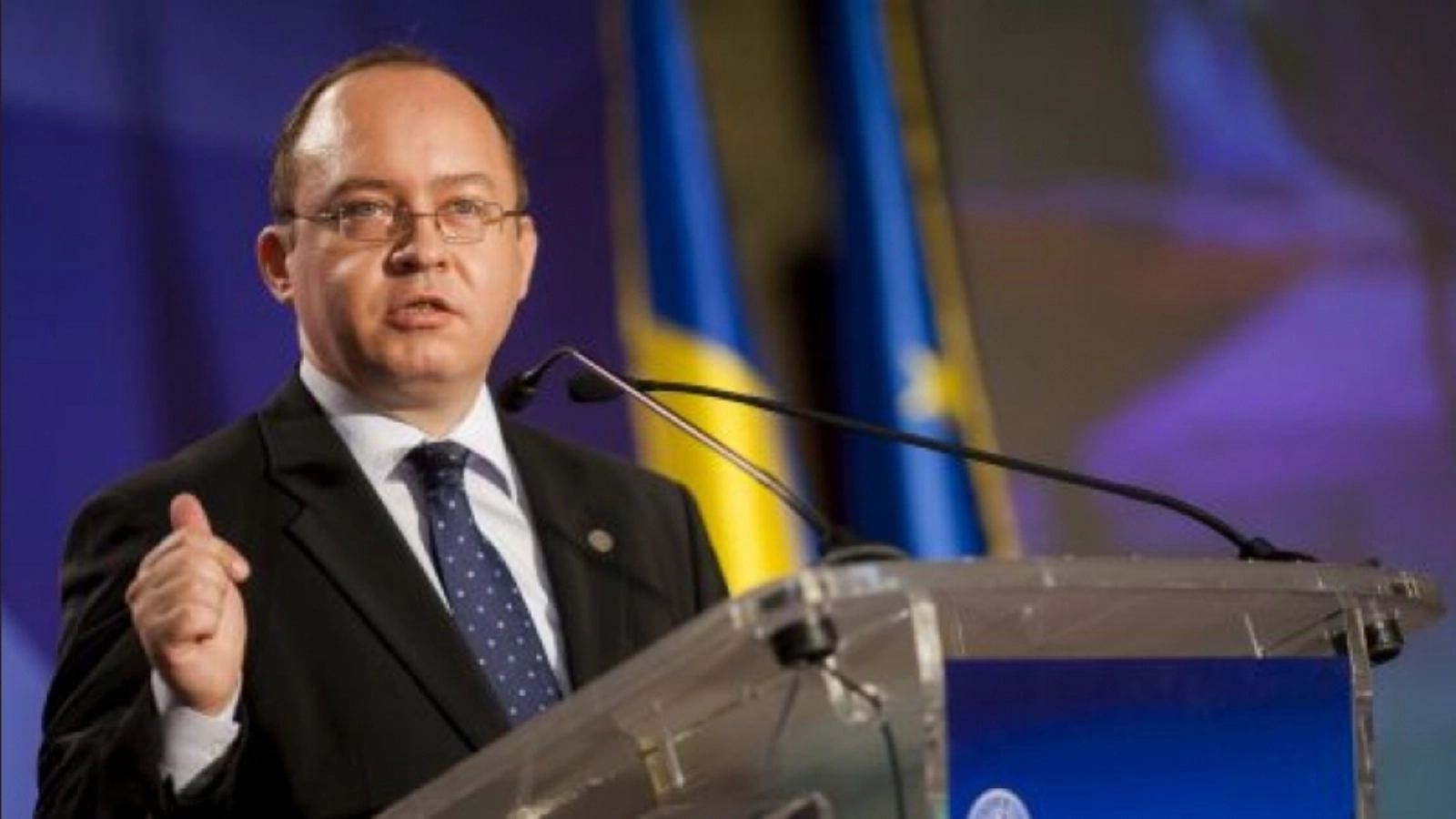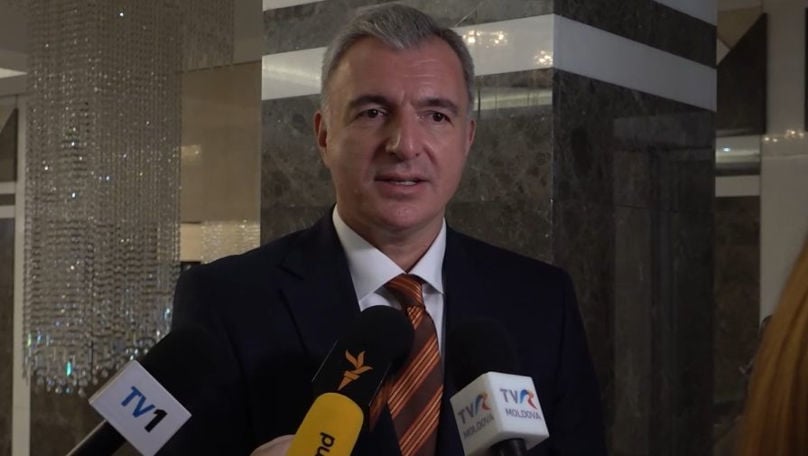Austria's veto against Romania's accession to the European free movement area "remains unjustified in a Europe of principles and cooperation in good faith", declared, in an interview to AGERPRES, the minister of Foreign Affairs, Bogdan Aurescu, adding that our country benefited, in the Schengen file, from the "strongest and most vocal support".
"It must be said that, never in the history of this file in the last 11 years, has Romania benefited from stronger and more vocal support from its European partners, member states and European institutions, for its accession to Schengen," said the Romanian chief diplomat.
He specified that the change in attitude of countries such as Germany, France, the Netherlands and Finland, which were known to have a particularly reluctant position in the past, "was also determined by Romania's firm, prompt response regarding the situation in Ukraine, but above all, by the efforts that Romania has undertaken throughout this period to prove that its place is in Schengen".
Bogdan Aurescu spoke, in the interview, of a "sudden" change in Austria's position.
"The sudden change of Austria's position on this subject, on November 18, only two days after the Salzburg Forum Declaration, not only could not be anticipated, but took all European partners and even the Austrian coalition partners by surprise. Previously, there was no signal in the sense of Austria's opposition, in all the contacts of the embassy or of the Ministry of Foreign Affairs (MAE, ed. n.) or the Ministry of Internal Affairs (MAI, ed.n.)," maintained Aurescu.
As regards the illegal migration argument invoked by Vienna, Aurescu emphasized that "Romania is not on the Western Balkans route of illegal migration and that, in addition, it is not a relevant source for secondary movements within the EU".
Regarding the prospects of Romania's accession to Schengen, the minister of Foreign Affairs opined that "the statements that it does not matter what has been done so far and that we are starting again from scratch are completely wrong", Aurescu pointing out that, on December 8, our country won "a lot of respect, sympathy".
"We are building on everything that has been achieved so far. The evaluation missions must not be resumed, the procedure in the European Parliament must not be resumed. We have the full support of the member states and the European institutions. Through the firm conduct of December 8, we have gained a lot of respect, sympathy and we have a very good momentum at the European level. I have already discussed with the current Czech presidency and the future Swedish presidency. All avenues of action will be used," said Bogdan Aurescu.
AGERPRES: Mister Minister, related to Austria's vote against the accession of Romania and Bulgaria to the Schengen Area, there is a chronology of bilateral meetings on this topic, a chronology in which the message is repeated that, until November 18, "no problem regarding Schengen extension with Romania". In his motivation and including at the European Council on Thursday, chancellor Karl Nehammer invoked illegal migration. The data obtained by AGERPRES from the Border Police show that, from January to October 2022, the illegal entry in the country of over 26,000 people was fought. The details regarding migration routes and illegal migration on Romanian territory were discussed punctually, at the bilateral Austria-Romania level, did you have any signals that Austria will block Romania's accession to the Schengen Area and if so, when?
Bogdan Aurescu: First of all, before I refer strictly to Austria, I must say that never in the history of this file in the last 11 years has Romania benefited from stronger and more vocal support from European partners, member states and European institutions, for the accession to Schengen. Moreover, member states such as Germany, France, the Netherlands and Finland, which were known in the past to have a particularly reluctant position for various reasons regarding the advancement of this objective, have announced, unequivocally, that they support Romania's accession to Schengen.
The change in attitude was also determined by Romania's firm, prompt response regarding the situation in Ukraine, and, above all, by the efforts that Romania undertook throughout this period to prove that its place is in Schengen. The strong support at the JHA Council on December 8, but also the reactions and political statements of the European partners after this Council are the result of a trust-building process, based on concrete facts, on our constructive but firm attitude at the European level and on the renewed evidence regarding the thorough way in which Romania ensures the security of the external border of the EU and in which it applies the Schengen acquis.This accumulation of results is due to the complex action carried out under the coordination of president Iohannis and prime minister Ciuca, of the MAE, MAI, together with colleagues from the Presidential Administration. Prime minister Ciuca was extremely involved, I was constantly in contact with him. The president of the PSD (Social Democratic Party, ed. n.), Marcel Ciolacu, with whom I was also in close contact to convince the Swedish social democrats, the opposition, to give up their position against Romania's accession, also got involved directly, personally and effectively. At the same time, I was in frequent and effective contact with MEPs Siegfried Muresan and Victor Negrescu, the latter also on the situation in Sweden.
Basically, in the last months, thanks to the efforts coordinated and undertaken by president Iohannis, Romania convinced France, Germany - through the direct involvement of the president, Finland - through my efforts, including in the context of supporting NATO accession, Sweden - including through my contacts with Ardalan Shekaravi, Swedish social-democratic leader, the Netherlands - by fulfilling the conditions requested by prime minister Rutte, a new technical evaluation mission, carried out on November 17, with a very positive report, and a positive CVM report. And, in the end, all the member states supported us, with the exception of Austria.
Traditionally, Austria was among the supporters of Romania's accession to the Schengen area. This support was also based on the very good bilateral cooperation in matters of internal affairs and police cooperation. Moreover, Romania and Austria are part of and are very active in a dedicated regional cooperation format in these fields, namely the Salzburg Forum, which includes the ministers of Interior from Central and South-Eastern Europe - Austria, Bulgaria, Croatia, Czech Republic, Hungary, Poland, Romania, Slovakia and Slovenia.
It should also be mentioned that, in the political-diplomatic dialogue that we had constantly with Austria in recent years, including the first part of this year, the representatives of Austria assured us of their support for Romania's accession to the Schengen area.
It is also important to note that all MEPs from Austria, including those of the OVP party of the chancellor and the Austrian minister of the Interior, voted in favour of the adoption of the European Parliament Resolution of October 18, which ruled for Romania's accession to the Schengen area, with the exception of three MEPs belonging to the far-right FPO party. Such a vote in favour of Romania's accession could not have taken place in the absence of a favourable position to the accession of the Austrian government. Moreover, on November 16, 2022, just two days before the change of its position, Austria agreed, together with the other member states of the Salzburg Forum, during a meeting held in Bucharest, a Political Declaration, in which the support for Romania's accession to Schengen was explicitly mentioned.
As such, the sudden change of Austria's position on this subject, on November 18, only two days after the Salzburg Forum Declaration, not only could not be anticipated, but took all European partners and even coalition partners from Austria by surprise. Previously, there was no signal in the sense of Austria's opposition, in all the contacts of the embassy or of the MAE or MAI. On the contrary, as I said, the cooperation between the ministries of the Interior was excellent and all 24 contacts in the last year, as the Romanian minister of the Interior recently declared, did not signal any problem related to Austria's position against Romania's accession. If in all these contacts between the Austrian and Romanian ministries of the Interior, which precisely manage the issue of police cooperation and migration, such signals did not appear prior to the November 18 declaration of the Austrian minister of the Interior Karner, it is clear that Austria's political decision was made suddenly, without notice. Subsequently, Austria maintained a totally inflexible position on this subject, despite the attempts of the other partners, of the European institutions, especially the European Commission, to meet Austria's concerns and to facilitate a constructive and principled solution at the European level.
As far as Austria's motivation is concerned, as it emerged from the public statements of the chancellor and the federal minister of the Interior, it is invoked the special migratory pressure that Austria is subject to at the moment, due to the fact that it hosts 100,000 illegal migrants, and the Austrian authorities have said that a large part of them, about 75,000, according to public statements, were not previously registered in any other EU member state, as provided for by the European asylum legislation. Romania, through the Ministry of Internal Affairs presented clear European statistics of the European agencies in the field, including at the Vienna meetings of the Interior ministers, which says that Romania is not on the Western Balkans route of illegal migration and that, in addition, it is not a relevant source for secondary movements within the EU. Thus, among other things, it was shown that, comparing with the European statistics regarding all illegal attempts to cross the external border of the EU on the Balkan route in the first 10 months of 2022, the FRONTEX figures for Romania represent only 2.7%, and of all secondary migrants, i.e. those registered in Romania who then arrived in Austria, represent only 1.87% of those identified as having arrived or being in this country illegally. In addition, these secondary movements from Romania to other EU states decreased in 2022 by 25% compared to last year.
It must be very clear to everyone that Austria has not made specific requests from Romania, but, as Austrian officials have publicly stated, it is asking the European Commission for proposals and measures to manage illegal migration on the Western Balkans route, which is currently causing the pressure migration in Austria.
Austria also formulated these requirements on the occasion of the JHA Extraordinary Council on November 25, 2022, dedicated to migration issues. Prior to that moment, based on the signals received during the first visit of the Romanian minister of the Interior to Vienna, I worked very seriously and quickly with the European Commission so that it could present an Action Plan dedicated to the Western Balkans route. And the European Commission presented this plan on December 5, 2022. It takes up many of Austria's requests in an attempt to respond to the challenges caused by illegal migration in the region. Austria declared these days, including during my discussion with the Austrian foreign minister on December 12, on the sidelines of the Foreign Affairs Council in Brussels, that
the plan presented by the European Commission represents a step forward in solving the current challenges.
Romania will continue, as before, to get involved and support effective and balanced measures at the EU level that lead to a sustainable management of the phenomenon of migration, a particularly sensitive subject that continues to generate, unfortunately, difficulties for many member states. Romania, which is not part of the problem, will be, as before, part of the European solution.
AGERPRES: From January 1, Sweden takes over the six-month rotating presidency of the European Council. We know that, at the beginning of December, Sweden decided to support Romania's integration into Schengen, and the European Commissioner for Internal Affairs, Ylva Johansson, declared that her main priority will remain the accession of Romania and Bulgaria to the Schengen area. What are the prospects for integration in the free movement area in the first half of next year?
Bogdan Aurescu: Certainly, as president Iohannis said in Brussels, we will continue the diplomatic efforts to obtain a positive decision in the case of Romania's accession to Schengen. We will continue the dialogue with all European partners, including Austria, with the European Commission, to identify ways out of this deadlock created by the negative vote of the JHA Council on December 8, 2022. We will continue with all the energy and all the tools. The statements that it doesn't matter what has been done so far and that we start again from scratch are completely wrong. On the contrary, we are building on everything that has been achieved so far. The evaluation missions must not be resumed, the procedure in the European Parliament must not be resumed. We have the full support of the member states and the European institutions. Through the firm conduct of December 8, we gained a lot of respect, sympathy and we have a very good momentum at the European level. I have already discussed with the current Czech presidency and the future Swedish presidency. All courses of action will be used. At the Foreign Affairs Council on December 12, I had several discussions with my Austrian counterpart, Alexander Schallenberg, including a consistent bilateral conversation, preceded by a phone call on December 9, where we agreed to maintain a dialogue constantly and see how we can contribute to moving forward in the direction of a positive decision.
I think that what it is important is that all the European partners support us in this endeavour and are aware of how unfair the decision of the JHA Council was, realizing, at the same time, the need to identify a solution as quickly as possible, given that there is no doubt about Romania's contribution to the consolidation of the Union's security, to the overall performance of the space of free movement with Romania as a member state with full rights. As such, we will work together with all of them to advance and obtain, in the shortest possible time, a positive decision for Romania.
AGERPRES: The vote against Romania's accession to Schengen was "together" with Bulgaria. There was information regarding a possible decoupling of the two countries. What is the prospect for this separate evaluation, of Romania and Bulgaria, to take place in the future? And what would be the negotiation option for the joint accession of the two countries?
Bogdan Aurescu: Romania and Bulgaria jointly triggered this year, through the March declaration, all this procedural flow that led to the inclusion of the subject of accession on the agenda of the JHA Council. These visits practically took place following the declaration by which Romania and Bulgaria expressed their willingness to receive, on a voluntary basis, a team of experts, under the coordination of the Commission, for the evaluation of the implementation of the Schengen acquis by the two member states, visits that led to the elaboration of extremely favorable reports for both Romania and Bulgaria. And these reports were particularly useful for mobilizing support both from the European institutions and from the member states, all capitals receiving the reports. On the other hand, as the President of Romania said, the Netherlands voted against Bulgaria on December 8, and the Government's mandate approved on December 7 by Parliament in The Hague stated a series of conditions for changing its stance. It must also be said that, in the preparation of the JHA Council, variants were prepared that could lead, if they had been accepted by all the participants in the negotiations, not to a decoupling, but to an offset, namely an accession of the two states at different time intervals, Romania faster, Bulgaria
late, depending on the fulfillment of those conditions.
Both we and Bulgaria made special efforts to convince our European partners that we respect the Schengen acquis and that we are acting for the benefit of the Union. Of course we would like a solution to be identified for both member states and I am convinced that we will each continue to offer all the arguments to our partners in this regard.
AGERPRES: Romania's ambassador to Austria was called to the country for consultations, being replaced, currently, by the ad-interim charge of affairs. Also, there have been political signals that Romania wants to exercise its veto right against Austria, in international organizations, for example regarding the OSCE presidency. What will be the future relations between Romania and Austria both at the level of representation in Vienna and in terms of international mechanisms?
Bogdan Aurescu: As President Iohannis said, the Romanian authorities will not boycott Austria. Of course, Austria's veto remains an unjustified one in a Europe of principles and cooperation in good faith. We made sure to convey this message very firmly on all dialogue channels, both with the Austrian officials and with the other European partners. I reacted with all the diplomatic tools at my disposal, and the summoning of the Austrian ambassador to the Ministry of Foreign Affairs, which I ordered immediately, as well as the summoning of the Romanian ambassador in Vienna for consultations, which I also decided, are very strong signals of disapproval to show that we do not tolerate such attitudes against Romania. And, obviously, all of Austria's interests at the international level are in our attention.
At the same time, as Prime Minister Ciuca said, every citizen has the freedom to decide his own conduct. On a different note, I strongly protested against the inadmissible and completely unfounded accusations of the Austrian side according to which the Austrian companies in Romania were subjected to pressure or bad treatment. Such a thing did not exist and will not exist.
There was also talk about penalizing Austria by using the Court of Justice in Luxembourg of the European Union. Mr. President Iohannis clearly said that we will not resort to such a way. It is useful to say why this option is not feasible. I want to emphasize, once again, that the final objective pursued by Romania is the accession to Schengen in the shortest possible time. We have analyzed for a long time, seriously and thoroughly, together with all our legal experts, the legal ways we would have in the current situation. Thus, we have come to the conclusion that in the case of an action by Romania at the Court of Justice of the European Union against Austria, that is of a state-versus-state infringement, for Austria's failure to fulfill its obligations as a member state and for the violation of the principle of loyal cooperation, the time frame would not be to our advantage, the average duration of the procedure before the Court being about 2 years, more precisely 21.8 months.
It cannot be ruled that, once any action is initiated at the Court, this situation will be used as an argument, more or less political, by Austria to stop or delay, pending the Court's decision, the steps to express a new vote on Romania's accession. Moreover, this contentious phase is necessarily preceded by a notification addressed by the Romanian authorities to the European Commission, which has 3 months at its disposal to issue a reasoned opinion. Only after the 3 months could Romania notify the Court, so in total it can take more than 2 years. This type of action does not, therefore, seem to be an adequate tool for achieving the goal of rapid accession.
As regards other legal instruments - the action for annulment, respectively the action for failure to act -, these should be directed by Romania against the Council of the EU, although problematic from the perspective of the Romanian state is Austria's vote. In the case of these two actions, as well, the average duration of the procedure before the Luxembourg Court is also almost 2 years.
There would also be the option of an action of the Commission against Austria, also based on Austria's non-fulfillment of its obligations as a member state, but it would take just as long.
Moreover, in the case of all types of actions mentioned, the Court's decision, even if it were favorable to the Romanian state, would not take the place of a decision of the Council of the EU regarding Romania's accession to Schengen, a new vote within the EU Council should still actually take place. To put it more clearly, assuming that the Court would find that, in the context of the vote, Austria violated the EU norms invoked by Romania, the Court's decision could at most require Austria to refer to certain technical parameters in the context of expressing a future vote, but there would be no guarantee that this state would express a positive vote in the future.
There was also talk about compensation, but the legal analysis shows that these could possibly be obtained only through an action at the Court that targets the extra-contractual liability of the Union and the European Central Bank, therefore not of the member states, so it is not applicable in this case.
I do not want to continue in very technical terms, these procedures being extremely complex, but I conclude by simplifying: a possible action by Romania at the Court of Justice of the EU would not guarantee a quick and favorable vote from Austria following the decision.
































Comentează